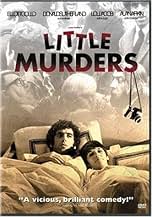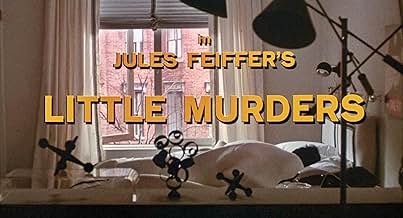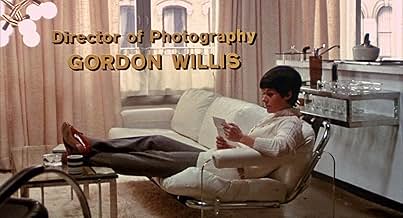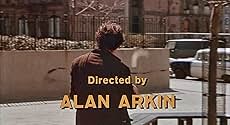Dark comedy where Alfred Chamberlain copes with urban violence, obscene phone calls, rusty water pipes, electrical blackouts, paranoia, and racial conflict during a 1970's summer as he gets ... Read allDark comedy where Alfred Chamberlain copes with urban violence, obscene phone calls, rusty water pipes, electrical blackouts, paranoia, and racial conflict during a 1970's summer as he gets to know his girlfriend Patsy Newquist's family.Dark comedy where Alfred Chamberlain copes with urban violence, obscene phone calls, rusty water pipes, electrical blackouts, paranoia, and racial conflict during a 1970's summer as he gets to know his girlfriend Patsy Newquist's family.
- Awards
- 1 nomination total
- Checkpoint Police Officer
- (uncredited)
Featured reviews
I think that my two favorite scenes are the appearances of Sutherland and Arkin. Sutherland plays a priest who seems to be a cross between Sutherland's characters from "MASH" and "Kelly's Heroes"; Arkin plays a detective who spouts out the craziest monologue explaining why there's a conspiracy behind the murders. Overall, this is very much a New York kind of movie. I should identify that there are several very long scenes during the movie, but it's certainly not a flick that you'll forget anytime soon. Impressive.
While I found it less funny during a recent viewing than I remembered, the message was still disturbing and contemporary. It is certainly satire and black comedy, but you often lose yourself in the story. It is a very individual film, different people will laugh at different times and at different things. During a theater viewing it seemed to isolate audience members from each other.
Jules Feiffer's screenplay is about Alfred (Elliot Gould), a NYC photographer and self- described "apathist", sort of an unengaged existentialist. He is completely disillusioned and has deadened himself to the cries, smells, sights and pains of violent city living; in a Big Apple even more adversarial than that of "The Out-Of-Towners".
Alfred can't feel much anymore but he takes an interest in Patsy (Marcia Rodd), a controlling interior decorator optimist, who wants to change him. Patsy has been able to stay upbeat and involved despite daily encounters with muggers, snipers, obscene callers, and a family that leaves a lot to be desired.
The film seems to be saying that harsh urban life cuts its people off from gentler human emotion. As an interior decorator Patsy's life is largely defined by her ability to control her possessions and the attitudes of those around her.
Patsy's father, mother and younger brother are living a painful parody of "family life," and Alfred's weirdness eventually allows him to fit right in. The dinner scene where he first meets her family is one of the funniest in film history.
The film illustrates that neither apathy nor constructive engagement are successful mechanisms for coping with the modern world. It seems to be saying that the only rational response to living in an insane environment is to vigorously participate in the insanity.
Then again, what do I know? I'm only a child.
I saw this film and then read the play it was based on, and both give off the same claustrophobic air of desperation while still being side-splittingly funny. It is definitely worth hunting down. In the words of Father Dupas, it is "all right."
remember as being funny mabey. I was skeptical at the beginning, I thought to myself a dated film with an absurd summery on the back. The only reason I sat and watched it was the list of actors, Sutherland and Gould. I was immediately enthralled. I have been a fan of Terry Gilliam films for a long time and to see a film that can achieve his insanity and social messages with out the elaborate sets and costumes Gilliam uses is astounding. The acting is superb, there is no other word that can encapsulate these performances. Every character is riveting until the end. The monologues given are thought provoking to say the least. My original thought that this film was dated could not be farther from the truth, I was in fact surprised by the connections that can be drawn to our modern times. I am surprised that this film did not receive more praise. It is also disappointing that the other Alan Arkin films were given less than glowing reviews. The only question I have is: is it to late to have a cult following for this movie? Anyone else in?
Did you know
- TriviaAfter seeing the film, Jean Renoir wrote to Alan Arkin, telling him "this film will never be forgotten".
- Quotes
Rev. Dupas: Why does one decide to marry? Social pressure? Boredom? Loneliness? Sexual appeasement? Love? I won't put any of these reasons down. Each in its own way is adequate, each is all right. Last year, I married a musician who wanted to get married in order to stop masturbating. Please, don't be startled, I'm not putting him down. That marriage did not work. But the man tried. He is now separated, still masturbating, but he is at peace with himself because he tried society's way.
- Alternate versionsOriginally rated 'R' when released in the U.S in 1971. In 1973 the film was cut to be re-rated 'PG' for a re-release.
- ConnectionsFeatured in Alan Arkin: Live from the TCM Classic Film Festival (2015)
- SoundtracksSkating In Central Park
Composed by John Lewis
Performed by The Modern Jazz Quartet
Through the courtesy of United Artists Records, Inc.
- How long is Little Murders?Powered by Alexa
Details
- Release date
- Country of origin
- Official site
- Language
- Also known as
- Little Murders
- Filming locations
- Brooklyn Boro Hall Court, New York City, New York, USA(courtroom sequence)
- Production companies
- See more company credits at IMDbPro
Box office
- Budget
- $1,340,000 (estimated)
- Runtime
- 1h 48m(108 min)
- Color
- Aspect ratio
- 1.85 : 1































